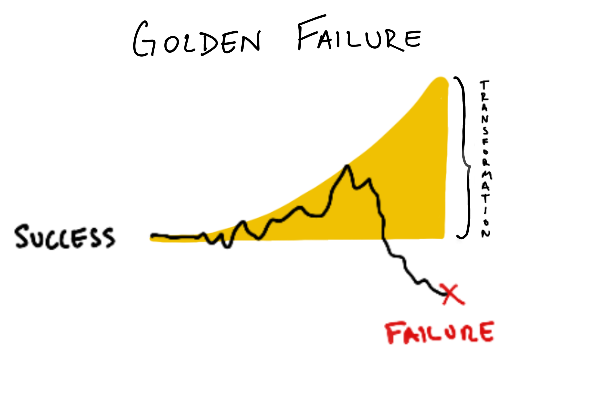A founder recently asked me, “How do you celebrate failure? I can’t let my people fail. If one of my sales reps doesn’t hit their target, how am I supposed to celebrate that?”
I didn’t have an answer.
When is failure worth celebrating? Why don’t we naturally celebrate failure? Why has “celebrate failure” become a core ethos for startups? What is missing from corporate culture that startups aspire to possess? What is the benefit of celebrating failure at a startup? Why do most startups not celebrate failure?
Is celebrating failure just an empty meme? Something that startup people say but don’t live? All talk and no walk?
I think the answer can be found in one of my favorite Brothers Grimm fairy tales: Iron John.
Iron John, also called the Wild Man in our Brothers Grimm story, is freed from the castle’s prison by the 8-year old prince. Upon his escape, the Wild Man takes the boy with him and promises to look after him.
On the first morning in the forest, the Wild Man takes the boy to a golden spring and tells the young boy to look after the spring and make sure nothing falls into it – or the spring will be ruined. The Wild Man says he’ll be back the next day to check on the boy and the spring.
The boy fails the first day’s test. And the second day. And the third day.
Yet the boy is rewarded with each failure.
When is failure NOT worth celebrating?
We have an innate and immediate sense of stupidity. We instinctively know when failure is the direct result of carelessness or slovenly excess. No husband has ever been celebrated for forgetting the milk. We do not celebrate this failure.
Is a sales person’s missed quota worth celebrating?
We assume the boy's mission to guard the golden spring is a task of importance, and this begs the question:
Is a sales quota more akin to forgotten milk or guarding a golden spring?
And what about the character of our hero? How does the hero’s character, the little prince or the sales rep, impact our celebration of failure?
How does the magnitude and worthiness of the task impact our perspective of the failure?
Day 1
On the first day, “the boy sat down at the spring’s edge. Occasionally he glimpsed a golden fish or a gold snake, and he took care to let nothing fall in. But as he sat there, his wounded finger was so painful that, without intending to, he dipped it into the water. He pulled it out instantly, but he saw that the finger had turned to gold, and no matter how much he washed it, the washing did no good.”
When the Wild Man returns the boy hides his finger, but the Wild Man knows. He says, “It’s ok this once, but don’t let it happen again.”
Day 2
On day two, the young boy has renewed determination and vigilance to watch over the golden spring. He was careful, no matter how much his finger hurt, not to dip it in the water. At one point he looks over the water’s edge and runs his hand through his hair. A single hair flitters into water and by the time the boy is able to retrieve it, it has already turned to gold.
When the Wild Man returns, he already knows about the single golden hair. “You’ve let a hair fall into the spring. I’ll allow it this time, but if it happens a third time it will dishonor the spring, and you will not be able to stay with me any longer.”
Day 3
On the third day, the boy sat by the spring and time passed slowly. The boy notices his reflection in the spring and he stares into his “own eyes, and in doing this, he leaned over farther and farther. All at once his long hair fell down over his forehead and into the water. He threw his head back but now all his hair, every bit, had turned gold, and it shone as if it were the sun itself.“
The Wild Man returns and tells the young boy he can not stay in the forest because he has not made it through the trial. “I see no evil in your heart, however, and I wish you well, so I’ll give you this gift: whenever you are in trouble, come to the edge of the forest and yell, ‘Iron John, Iron John!’ I’ll come to the edge of the forest and help you. My power is great, greater than you believe, and I have gold and silver in abundance.”
Golden Failure
The young boy is banished from the forest and finds himself in a foreign kingdom, stripped of his royal birth and privilege. He becomes a gardener inside the foreign king’s castle. The boy is starting at the bottom.
When the kingdom goes to war, he calls upon Iron John for help and rescues the king's broken army with his own magnificent battalion provided by Iron John. The boy is capitalizing on the opportunity.
The king wants to reward the hero who saved his kingdom and the boy asks for the princess’s hand in marriage. She accepts: "I already knew he was no gardener's boy from his golden hair." It’s an odd acceptance; the battlefield heroics seem secondary. She knows by his golden hair that he is not ordinary.
The golden hair is how the fairy tale signifies the transformation within the boy from the golden spring trial. He has changed in some fundamental way. He can never go back. In some versions of the Iron John story, the golden spring is a golden well.
It could be said that the boy has a well of experience, a well of fortitude, a well of character to draw upon because of his trial at the golden spring.
The fairy tale is blunt. The whole kingdom and every one in it is enriched by this boy’s transformation. The king, the princess, the boy, the boy’s parents, and even Iron John are better for his failure.
Robert Bly in his book “Iron John” summarizes: "These three days could be fifteen years in our time. The initiator gave him a task and he failed at it three times. But he receives a gift anyway each time. The failure rose from the pain he felt and from his human inability to keep attention. But the gift came from the water, with whom he had somehow established a relationship. We deduce that accepting an initiatory task is more important than succeeding or failing at it. We guess the boy has done all right.”
Robert Bly sees the Iron John story through the lens of a forgotten cultural practice: the initiation of boys into manhood.
In terms of celebrating failure, I see the young boy's transformation not exclusively as a rite of passage, but as a courageous, and infinitely worthy, undertaking beyond his talents and capabilities.
Buying the milk is not beyond my talents nor is it a courageous and infinitely worthy task.
A sales quota might be beyond a sales reps talents and capabilities, but is it courageous and infinitely worthy? Perhaps.
But what about entrepreneurship?
Stewarding a nascent idea into the world takes courage. Vigilantly looking after the idea, growing it with care like a gardener, is a task beyond the means of everyone just starting out. We can not be prepared for all that the journey will entail. It is impossible to be complete at the start because we can not know what will come. The journey transforms the entrepreneur, and that transformation will cast an eternal golden shadow enriching the entrepreneur’s life and all those around them.
Celebrating failure is about recognizing our golden hair earned in the attempt of pursuing something so grand, and so big, that we will be transformed by the journey – with or without “happily ever after.”
May we all be so fortunate to risk our own golden failure.

